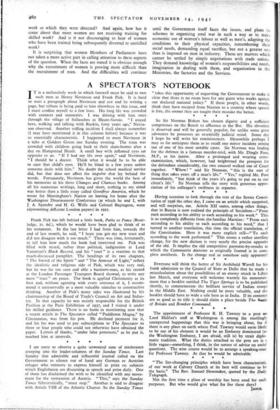A SPECTATOR'S NOTEBOOK I T is a melancholy week in which
farewell must be said to two such men as Henry Nevinson and Frank Pick. It is hard to start a paragraph about Nevinson and not end by writing a page, but tribute is being paid to him elsewhere in this issue, and I must confine myself to a few lines. His long life was crowded with contacts and memories. I was driving with him once through the village of Sallanches in Haute-Savoie. " I stayed here, walking and talking with Ruskin, forty years ago," Nevin- son observed. Another trifling incident I shall always remember (I may have mentioned it in this column before) because it was so essentially characteristic. I happened to meet Nevinson in a tube at Golders Green one Sunday evening. The train was crowded with children going back to their slum-homes after a day on Hampstead Heath. A small boy with inflamed eyes sat opposite to us. " If I had my life over again," said Nevinson, " I should be a doctor. Think what it would be to be able to cure that child's eyes. He'll be blind in a few years unless someone deals with him." No doubt the school medical service did, but that does not affect the impulse that lay behind the words. Fortunately, Nevinson has given the world the best of his memories in his three Changes and Chances books. Among all his numerous writings, long and short, nothing to my mind was better than a little essay called Goodbye America, which he wrote for Massingham's Nation on leaving for home after the Washington Disarmament Conference (at which he and I, with J. A. Spender and H. G. Wells and Colonel Repington, were representing different London papers) in 1922.






















 Previous page
Previous page